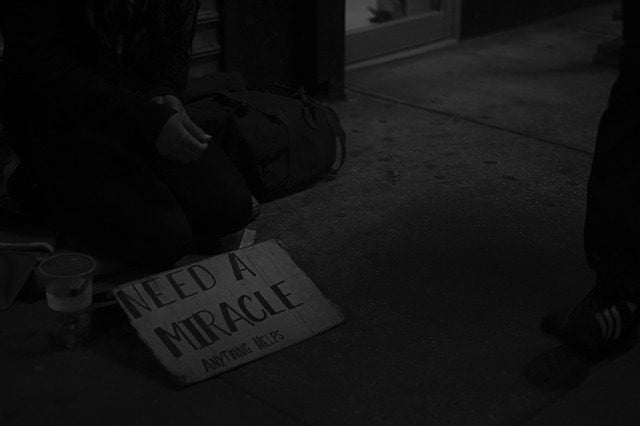
Yesterday, the discourse on Twitter was all about trans people. A few days ago, all anyone could talk about was abortion, and now it’s trans people. A few days ago, traditionalist Catholics with the Simpsons or pictures of Saint Pio in their profile photos were telling everyone that women who get abortions do so out of pure selfishness and there’s no need to try to understand them. They were only saying this because they loved women and children and wanted to save them. Yesterday, modest stay-at-home wives with wedding pictures in their profile photos were explaining that trans people couldn’t be Catholic and that they were going to hell. They were only saying this because they loved trans people and wanted to save them.
My Catholic trans brothers and sisters and other members of LGBTQ Catholic Twitter were pushing back, pretty politely all things considered, but they weren’t getting anywhere. They tried to explain the basic catechetical principle that desires and feelings aren’t sins, to no avail. They tried to say how they’d been raised feeling that they were monsters going to hell for desires and emotions they could not change, and they were treated like scum. Some mentioned they’d left the Church because they felt so despised, and they were heckled for not being strong enough. This went on for hours. Social media devolved into an open sewer a lot more quickly than usual.
Meanwhile, here in Steubenville, in the neighborhood of LaBelle, in the shadow of a notorious Catholic university, a neighbor posted on Facebook asking for something for herself and her children to eat because her food stamps didn’t come until Monday. People were counseling her to go to the food pantry, but she’d already eaten her food pantry box and they could only give her one a month. She was asking for anything, “we’re not picky, things to cook, eggs, bread and lunch meat, anything.”
Neighbors decided to tag team and help her. Nobody had much. Somebody said they could get her some food for the weekend if she could hold out a few days. Somebody else said they’d bring her ramen and macaroni tomorrow. I said if they’d do that, I might be able to get her something for the evening’s dinner. My friends had helped out with my birthday donation drive for the poor and homeless in Steubenville, so there were cans of soup and bags of crackers and granola bars in my living room that I was supposed to give away anyway. People have given us much more lavish emergency help when we were struggling. That’s how neighbors in LaBelle keep each other alive, or they don’t. I brought her some of the food, and she was happy to get it.
I got back home to find that my friends had sent me another big pile of gifts for me to donate to the charities in town. One of the things that came in was a big box of hard candy: candy canes, Werthers, glassy Jolly Ranchers. This was to give to the outreach to the addicts, the one that has a needle exchange. My friend who had been addicted says that’s what addicts desperately crave when they’re in withdrawal: plain sugar with no bulk. They can have snacks later, but the first step is hard candy and juice. They’re the only things they could keep down. I was very thankful that somebody had given me that advice and somebody else sent all that candy.
It was too late to go out again, so I packed the gifts into our hand cart to take out to the car tomorrow. The car is still in its hiding place so it won’t be vandalized again. My menacing neighbor is still alive, fading visibly from week to week, muttering at her voices or maybe at us. I can’t exactly feel sorry for her after the way she’s tortured us, but I can recognize that the situation is tragic. I’ve explained to Rosie that she isn’t well, and we ought to help her, but she won’t accept help and gets violent so the best we can do is ignore her awhile longer and try to find a new house. I said that the whole situation is wrong. There ought to be mental health care for people like her and it ought to be dignified and gentle, but there’s nothing like that around. The mental facilities are notoriously awful. People with mental illness and cancer scream it out alone. Someone should be helping people like her, but it’s out of my hands. She’s just another terrifying Gothic character in Steubenville, like the woman who killed her baby downtown, or the man who shot Tink, or the mother who used to hit Diamond at the soup kitchen. I can’t help these people. I am not enough. And what’s more I don’t feel that I want to help because I’m angry at their cruelty, but I’m trying to recognize they didn’t get that way by themselves.
I got back online, and found that traditionalist Catholics with pretty photos were still talking about how horrible trans people were. They were only saying this because they loved them, and they wanted to encourage them to go to Heaven by reminding them that they were horrible. And the conversation went on all night.
There are two different Gospels which I have heard, in my day to day life and my interactions with Christians. I am convinced that these two are diametrically opposed. You will either love one and despise the other, or you’ll do the reverse.
One says that people who are not like you are awful and need to be reminded that they’re awful, and that the way to get into Heaven is by hurting them until they change.
The other says “I am hungry and I need you feed me. I am thirsty and I need a drink. I am addicted and I need help. I am sick and no one cares for me. I am mentally ill and have been abandoned. I have children and I’m too traumatized to care for them.”
There’s the gospel on your phone or laptop, and there’s the one next door and down the block.
One gospel can be fulfilled by tweeting mean things on social media, by deliberately misunderstanding others for fear you’d see someone’s humanity, by refusing to be kind or find any shared ground. The other involves hard candy, canned soup, cancer and addiction. One builds you up and makes you feel righteous. The other will make you feel more and more helpless and upset the longer you study it, but if enough of us feel helpless and upset, we might stand a chance at changing things for the better.
There is the cheap grace of hurting people that you think made the wrong choice. And there is the costly grace of recognizing that people are suffering because they don’t have good choices. That the only choices you’re responsible for are your choices of how to respond to the world, and not anybody else’s choices in it.
I think that learning the harsh lesson of one of those gospels might lead you to Heaven.
I’ll leave you to decide which one you think that is.
Image via Pixabay
Mary Pezzulo is the author of Meditations on the Way of the Cross and Stumbling into Grace: How We Meet God in Tiny Works of Mercy.
Steel Magnificat operates almost entirely on tips. To tip the author, visit our donate page.













